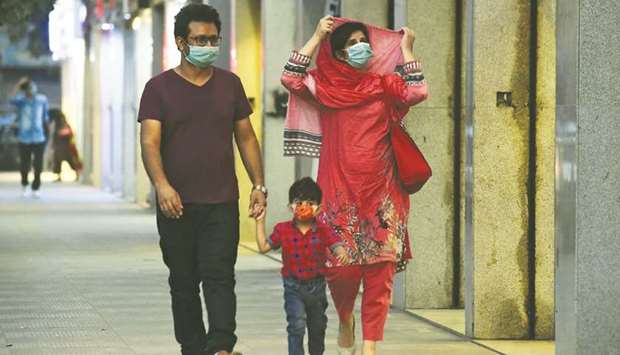A mandatory mask order came into force in Pakistani cities yesterday in a bid to prevent a second wave of coronavirus cases as winter approaches.
For months Pakistan appeared to have dodged the worst of the pandemic, baffling health experts after fears its crowded urban areas and ramshackle hospitals would be overrun.
But cases have been steadily rising in recent weeks.
Pakistani health officials on Wednesday unveiled a string of new measures that began from yesterday, including mandatory mask orders in the country’s major urban areas, lockdowns in hotspots, and restrictions on some businesses’ operating hours.
“We have reached a point where we have to implement certain restrictions... our focus will be on the cities with higher positivity,” said Dr Faisal Sultan, a special assistant to the prime minister on health, earlier this week.
Pakistan has confirmed more than 331,000 cases including over 6,700 deaths since the virus entered the country in late February.
Observers say with only limited testing the true number of infections is likely considerably higher.
The country’s coronavirus positivity rate crossed 3 per cent mark for the first time in more than 70 days, Federal Minister for Planning Asad Umar said yesterday, urging the public to follow safety guidelines amid the deteriorating situation of the pandemic.
Umar, who also supervises Covid-19 strategy, said, “after more than 70 days the national Covid positivity ratio was higher than 3 per cent yesterday”.
He said the National Command and Operations Centre (NCOC) has tightened restrictions on some high-risk public activities but the rising spread of the disease can only be controlled if people believe in the need for precautions.
Pakistan reported 908 new cases of coronavirus on October 28, the highest number of positive cases since July 29. The authorities conducted 29,449 tests of which 908 returned positive while 16 deaths were also recorded in the day.
The federal authorities have issued multiple warnings in the past few days on the ignorance towards implementation of Covid-19 SOPs as the second wave hits the country.
The NCOC issued fresh rules regarding the closure of wedding halls and shopping malls and made the wearing of face mask mandatory.
Dr Faisal Sultan had said a few weeks ago, 400-500 cases were being reported across the country on a daily basis. The tally, he said, had shot up to 700-750 cases per day.
“The coronavirus death rate has increased in the country,” he said, adding the positivity ratio had surged to 2.5-2.75 per cent.
Dr Faisal said people were not adhering to coronavirus precautions as they should, given the pandemic was still far from over.
A total of 491 “micro smart lockdowns” have been imposed in the Punjab province.
In Pakistan, the Covid-19 caseload now stands at 330,905, while 6,773 people have died to date.
Punjab, which has the recorded the second-highest tally of infections after Sindh in the country, has imposed 491 “micro smart lockdowns” across the province, according to official documents.
In Gujrat, there are 29 “micro smart lockdowns”, three in Hafizabad, two in Jhang, eight in Jhelum, three in Kasur, six in Khanewal, and five in Khushab.
With an uptick in those sickened by the deadly virus, the province has also ordered businesses and commercial activities to shut down at 10pm in Lahore, Multan, and Rawalpindi.
However, medical stores, pharmacies, tandoors, printing press, call centres, and takeaway from restaurants have been exempted from the new timings.
Separately, public parks will close at 6pm.

A family wearing facemasks as a preventive measure against the coronavirus walk alongside a street in Karachi yesterday. (AFP)
